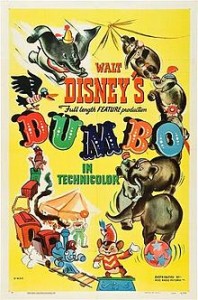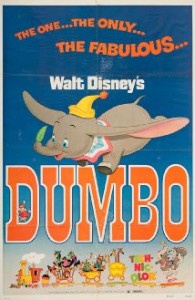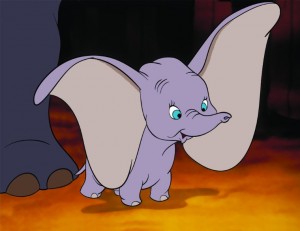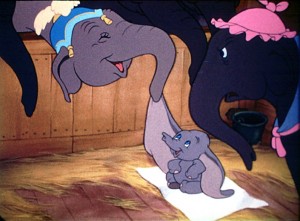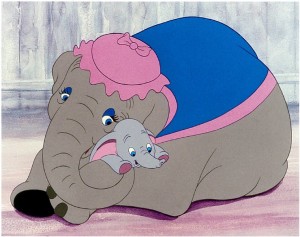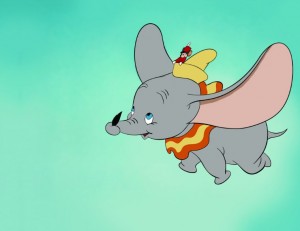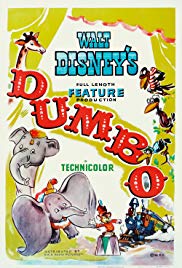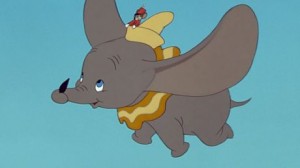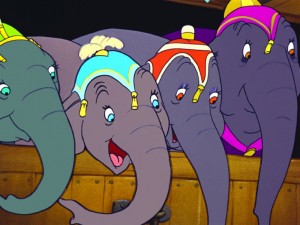Dumbo **** (1941, voices of Sterling Holloway, Edward Brophy, James Baskett) – Classic Movie Review 1253
Walt Disney’s simple, charming, beautifully animated 1941 cartoon Dumbo, made in hand-painted images and filmed in gorgeous Technicolor, tells the magical tale of a flying baby elephant with big ears, who learns to fly using his lugs as wings, and of his friendship with his big-headed mouse friend Timothy. Despite the devastating effects of the advent of World War Two, it was still the most financially successful Disney film of the 1940s.
The main character is Jumbo Jr, a semi-anthropomorphic elephant who is cruelly nicknamed Dumbo and ridiculed for his big ears, but he is capable of flying by using his ears as wings. Throughout most of the film, his only true friend, aside from his mother, is the mouse Timothy – a relationship mocking the usual animosity between mice and elephants.
Alas, Dumbo is as dumb as his name suggests, so Dumbo does not have any spoken dialogue. But Edward Brophy has a grand time voicing the moralising mouse, who teaches Dumbo how to become the ‘ninth wonder of the universe’ and the only flying elephant in the whole world.
In the film there are memorable, quite brilliant highlights such as the stars seeing pink elephants when drunk or scoffing crows performing ‘When I See an Elephant Fly’ (music by Oliver Wallace, lyrics by Ned Washington, sung by Cliff Edwards, Jim Carmichael, and the Hall Johnson Choir).
Verna Felton is the voice of Elephant Matriarch, Cliff Edwards is Jim Crow, the leader of the group of crows, Herman Bing is The Ringmaster, Margaret Wright is Casey Junior, the sentient tender engine hauling the circus train, James Baskett is Fat Crow and Sterling Holloway is Mr Stork. None of the voice actors received screen credit, as in the film’s predecessors Snow White and the Seven Dwarfs (1937) and Pinocchio (1940).
Dumbo is the fourth full-length animated feature cartoon in the Walt Disney Animated Classics series, following Snow White and the Seven Dwarfs (1937) and Pinocchio (1940) and Fantasia (1940). It is based on a children’s story written by Helen Aberson and illustrated by Harold Pearl for the prototype of a novelty toy called Roll-A-Book, similar to a panorama. It involved only eight drawings and just a few lines of text, and had Red Robin as Dumbo’s ally instead of Timothy Mouse.
Dumbo won the 1941 Academy Award for Best Original Music Score for musical directors Frank Churchill and Oliver Wallace. Churchill and lyricist Ned Washington were also nominated for the Academy Award for Best Song for ‘Baby Mine’ (sung by Betty Noyes) that plays during Dumbo’s visit to his mother’s cell. The film also won Best Animation Design at the 1947 Cannes Film Festival.
Dumbo was made to try to recoup the financial losses of Fantasia. It is the happy result of a pursuit of simplicity and economy for the Disney studio and, at only 64 minutes, it is one of Disney’s shortest animated features. The film cost only $950,000 to produce, half that of Snow White and the Seven Dwarfs, less than a third of Pinocchio and much less than Fantasia.
Dumbo grossed $1.6 million during its original release. It and Snow White were the only two pre-1943 Disney features to go into profit on original release. The film was re-released in cinemas in 1949, 1959, 1972 and 1976.
Dumbo II was supposed to be set on the day immediately following the end of the first Dumbo movie. However, John Lasseter cancelled Dumbo II soon after being named Chief Creative Officer of Walt Disney Animation Studios in 2006.
In December 1941, Time magazine planned to have Dumbo on its cover to commemorate its success, but it was dropped due to the attack on Pearl Harbor.
On 9 July 2014, it was revealed that Disney is developing a new live-action movie based on the classic 1941 animation. Transformers: Age of Extinction writer Ehren Kruger is penning the script. That film finally saw the light of day five years later as Dumbo, and is released on 29 March 2019, directed by Tim Burton, who made Alice in Wonderland (2010) for Disney. It cost $170,000,000 to produce against the original’s $950,000.
http://derekwinnert.com/fantasia-1940-walt-disney-classic-movie-review-1250/
http://derekwinnert.com/pinocchio-1940-voice-dickie-jones-classic-movie-review-1407/
© Derek Winnert 2014 Classic Movie Review 1177
Link to Derek Winnert’s home page for more movie reviews: http://derekwinnert.com/

